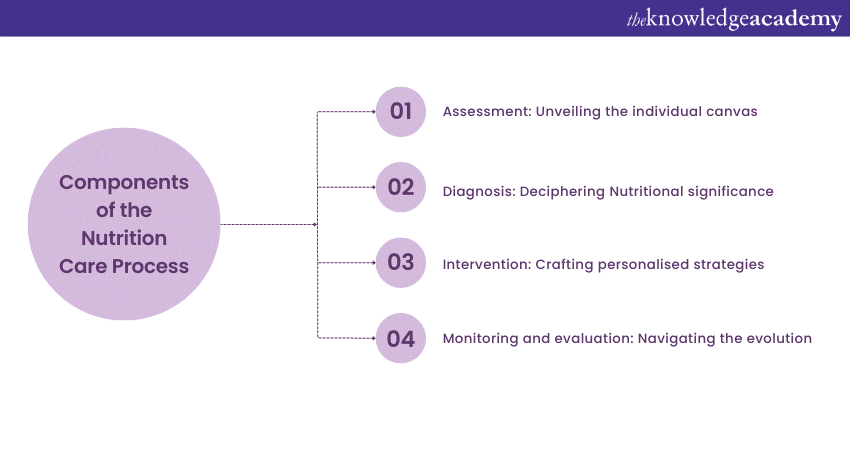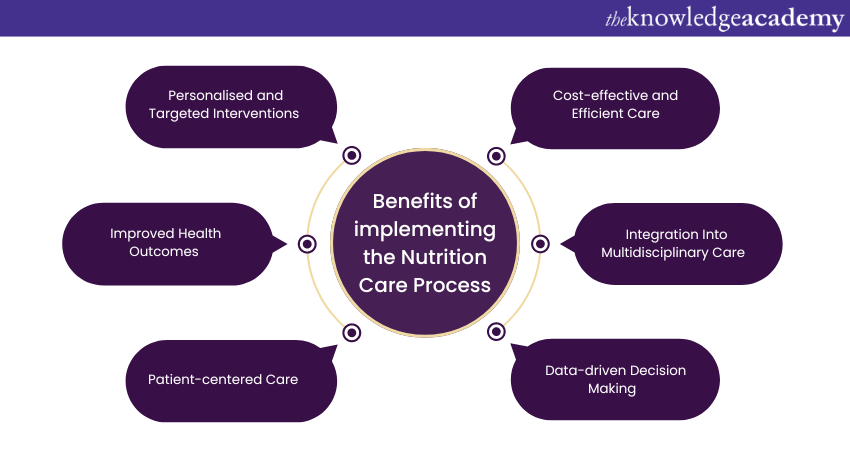We may not have the course you’re looking for. If you enquire or give us a call on +1 7204454674 and speak to our training experts, we may still be able to help with your training requirements.
Training Outcomes Within Your Budget!
We ensure quality, budget-alignment, and timely delivery by our expert instructors.

How do you navigate the maze of nutritional advice and truly understand what your body needs? Enter the Nutrition Care Process—a game-changing approach that removes the guesswork out of your health journey. Imagine a personalised roadmap crafted by experts that guides you towards optimal well-being through tailored nutritional care.
Have you ever wished for a customised health plan that actually works for you? The Nutrition Care Process makes this a reality, transforming how you approach your diet and lifestyle. By delving deeply into your individual health profile, this innovative framework empowers you to make informed decisions and achieve lasting results. Embrace the Nutrition Care Process and take your initial step towards a healthier, more vibrant you.
Table of Contents
1) Nutrition Care Process- an overview
2) Components of the Nutrition Care Process
3) Key Players in the Nutrition Care Process
4) Benefits of Implementing the Nutrition Care Process
5) Conclusion
Nutrition Care Process- an overview
The Nutrition Care Process is a strategic framework central to effective nutritional care, guiding the journey from assessment to improved well-being. This section dives into the very essence of the NCP, defining its components and underscoring its paramount importance in healthcare.
a) Defining the Nutrition Care Process
The Nutrition Care Process consists of systematic steps guiding healthcare professionals to provide tailored nutrition interventions to individuals. It establishes a structured approach to addressing nutritional needs. This approach recognises that health is a multidimensional construct influenced by dietary habits, medical history, lifestyle, and more. The NCP is not merely a protocol; it's a dynamic blueprint for fostering optimal health through personalised care.
b) The significance of the Nutrition Care Process
A standardised and evidence-based approach to Nutrition Care is imperative in a world grappling with diverse dietary preferences, chronic diseases, and lifestyle-related health concerns. The NCP serves as a unifying language that healthcare professionals, patients, and researchers can speak, ensuring consistency and effective communication across the healthcare continuum.
The NCP's significance extends beyond the immediate Nutritional needs. By identifying and addressing underlying Nutritional issues, the NCP plays a pivotal role in preventing and managing chronic conditions, thus alleviating the burden on healthcare systems and improving quality of life. Moreover, the NCP fosters patient-centred care, recognising that each individual's health journey is unique and merits a tailored approach.
Components of the Nutrition Care Process
The Nutrition Care Process (NCP) is a comprehensive framework that breaks down the journey towards optimal health into four distinct yet interdependent components. Each component is crucial in delivering effective and personalised Nutrition care. Let’s break down the components of the Nutrition Care Process: ensuring individuals receive tailored interventions that are in sync with their unique needs and goals.

1) Assessment: Unveiling the individual canvas
a) Gather comprehensive information about an individual’s health, nutritional status, dietary habits, medical history, and lifestyle factors.
b) Serve as a canvas for healthcare providers to understand the individual’s health landscape.
2) Diagnosis: Deciphering Nutritional significance
a) Interpret assessment data to identify potential nutritional problems, deficiencies, or areas for improvement.
b) Focus on understanding the intricate interplay between nutrition and health.
3) Intervention: Crafting personalised strategies
a) Collaborate with individuals, particularly Registered Dietitian Nutritionists (RDNs), to design personalised nutrition plans.
b) Consider dietary preferences, cultural influences, and practicality.
c) Incorporate behaviour change techniques to promote healthier habits.
4) Monitoring and evaluation: Navigating the evolution
a) Nutrition care is a dynamic process, and the monitoring and evaluation phase reflects this ongoing nature.
b) Regular follow-ups and assessments track progress, ensuring the interventions are on target and making the desired impact.
Adjustments are made as necessary, acknowledging that health journeys are filled with twists and turns. The interconnectivity of these components is what sets the NCP apart. It's a cycle of care that begins with understanding the individual's health story, decoding its nutritional significance. Devising targeted strategies and adapting them as the journey progresses.
Learn skills to take proper control over your healthy lifestyle; sign up for our Healthy Lifestyles Training now!
Key players in the Nutrition Care Process
The Nutrition Care Process functions as a collaborative process with key players contributing their unique expertise. This collaborative approach ensures tailored nutrition care with dietary recommendations, empathy, and support for successful outcomes. The importance of the Nutrition Care Process lies in uniting professionals to effectively address individual needs. The following are the key players in the NCP:
1) Registered Dietitian Nutritionists (RDNs): Architects of Health
a) These trained professionals are at the heart of the NCP.
b) They guide individuals through the complex landscape of nutrition care.
c) RDNs interpret assessment data, translate nutritional significance, and create personalised strategies aligned with individual goals.
d) Their role extends beyond dietary recommendations.
2) Healthcare Team: Collaborative Compassion
a) Collaboration is essential in the NCP
b) Physicians, nurses, pharmacists, and other professionals contribute expertise
c) Holistic understanding ensures interventions align with medical considerations
d) Nutrition care integrates seamlessly with overall health management
3) Patient/client: The Center of the journey
a) Healthcare professionals do not solely lead the NCP; it centres around the individual seeking care—the patient or client.
b) Their active engagement and open communication fuel the entire process. Individuals play a pivotal role in providing insights into their health history, dietary preferences, challenges, and aspirations.
c) Their commitment to the process, adherence to recommendations, and willingness to embrace change shape the journey's success.
The interplay between these key players creates a dynamic and comprehensive approach to Nutrition care. RDNs provide expertise, the healthcare team ensures holistic care, and the individual brings their unique narrative and goals. This collaborative effort transforms the NCP from a clinical protocol into a personalised journey of empowerment and transformation.
Benefits of implementing the Nutrition Care Process
Adopting the Nutrition Care Process (NCP) brings multiple benefits that ripple through healthcare systems, individuals, and the broader community. The following are the benefits of implementing the NCP:

1) Personalised and targeted interventions
a) Individualised Recommendations: Based on assessment data, create personalised dietary plans tailored to an individual’s preferences, cultural context, and lifestyle. Address specific needs (e.g., vegetarian diets, food allergies).
b) Behavioural Strategies: Incorporate behaviour change techniques to promote adherence. Educate individuals on portion control, mindful eating, and meal planning.
c) Sustainability: Ensure recommendations are realistic and sustainable for long-term health. Consider practicality and affordability.
2) Improved health outcomes
a) Early Intervention: Detect nutritional deficiencies or risks early to prevent complications. Manage conditions like hypertension, diabetes, and hyperlipidemia.
b) Quality of Life: Alleviate symptoms (e.g., fatigue, weakness) through targeted interventions. Enhance overall well-being and functional status.
c) Preventive Approach: Reduce hospitalisations and emergency visits by addressing nutritional issues proactively.
3) Patient-centered care
a) Shared Decision Making: Involve individuals in goal setting and treatment planning. Respect preferences, values, and cultural beliefs.
b) Empowerment: Educate individuals about their health and nutrition. Encourage active participation in self-care.
c) Individual Context: Consider psychosocial factors (e.g., stress, social support) in interventions. Tailor communication styles to individual needs.
4) Cost-effective and efficient care
a) Preventive Savings: Early identification reduces long-term healthcare costs. Prevent complications that require expensive treatments.
b) Resource Allocation: Allocate resources to evidence-based strategies. Avoid unnecessary tests or interventions.
c) Improved Productivity: Better health outcomes lead to increased productivity and reduced absenteeism.
Integration into multidisciplinary care
a) Collaboration: Coordinate with physicians, nurses, and other healthcare professionals. Align nutrition care with medical treatments (e.g., drug-nutrient interactions).
b) Holistic Approach: Address physical, psychological, and social aspects of health. Enhance overall patient experience and satisfaction.
Data-driven decision making
a) Evidence-based Practice: Rely on scientific research and assessment data. Tailor interventions to individual needs.
b) Objective Monitoring: Measure progress objectively (e.g., weight, lab results). Adjust interventions based on data trends.
c) Confidence and Trust: Healthcare providers and individuals trust data-driven decisions. Enhance confidence in the effectiveness of interventions.
Become a certified Life Coach with our expert-led Life Coach Training - begin your transformative career today!
Conclusion
Understanding the Nutrition Care Process is the key to unlocking vibrant health and well-being. By embracing this personalised approach, prioritising tailored interventions, and incorporating comprehensive assessments, you can transform your health. Join us in this journey to maximise your nutrition and thrive like never before with the Nutrition Care Process.
Achieve your wellness goals with our expert-guided Nutrition and Fitness Training - join us today!
Frequently Asked Questions

During the Nutrition Assessment phase, healthcare professionals gather detailed information about an individual's health, dietary habits, medical history, and lifestyle. This comprehensive evaluation helps identify nutritional needs, guiding personalised care and intervention strategies.

Technology enhances the Nutrition Care Process by providing tools for detailed dietary tracking, personalised meal planning, and real-time data analysis. It enables effortless communication between healthcare providers and patients, improving accuracy and efficiency in nutritional care.

The Knowledge Academy takes global learning to new heights, offering over 30,000 online courses across 490+ locations in 220 countries. This expansive reach ensures accessibility and convenience for learners worldwide.
Alongside our diverse Online Course Catalogue, encompassing 17 major categories, we go the extra mile by providing a plethora of free educational Online Resources like News updates, Blogs, videos, webinars, and interview questions. Tailoring learning experiences further, professionals can maximise value with customisable Course Bundles of TKA.

The Knowledge Academy’s Knowledge Pass, a prepaid voucher, adds another layer of flexibility, allowing course bookings over a 12-month period. Join us on a journey where education knows no bounds.

The Knowledge Academy offers various Healthy Lifestyles Training, including Nutrition Course, Nutrition And Fitness Training, Active And Healthy Lifestyles Training and Life Coach Training. These courses cater to different skill levels, providing comprehensive insights into become a nutrition coach.
Our Health & Safety Blogs cover a range of topics related to Healthy Lifestyles, offering valuable resources, best practices, and industry insights. Whether you are a beginner or looking to advance your Health and Safety skills, The Knowledge Academy's diverse courses and informative blogs have got you covered.
Upcoming Business Skills Resources Batches & Dates
Date
 Life Coach Training
Life Coach Training
Fri 29th Nov 2024
Fri 17th Jan 2025
Fri 21st Feb 2025
Fri 4th Apr 2025
Fri 6th Jun 2025
Fri 25th Jul 2025
Fri 7th Nov 2025
Fri 26th Dec 2025







 Top Rated Course
Top Rated Course



 If you wish to make any changes to your course, please
If you wish to make any changes to your course, please


